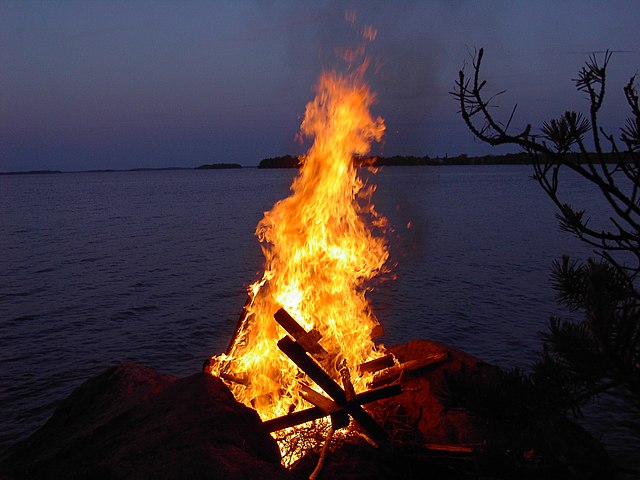Hey Gentle Readers, living in Latvia means getting used to the Latvian culture and traditions that the Latvian people hold so dear. One of these traditions is Jani.
The Jāņi celebrated today is a living ancient pagan tradition. For others, the holiday is like a meditation based on the beliefs and actions of their ancestors. For others it's a way to cleanse the soul and body with song and with a visit to t he bathhouse – and for others still it's a time to dance, eat, drink and be merry.

The Jāņi celebrated today is a living ancient pagan tradition. For others, the holiday is like a meditation based on the beliefs and actions of their ancestors. For others it's a way to cleanse the soul and body with song and with a visit to t he bathhouse – and for others still it's a time to dance, eat, drink and be merry.

According to ancient tradition, the
shortest night of the year must be spent by staying awake all night
by the glow of the bonfire. The time is spent singing songs and
enjoying traditional Līgo foods like cheese with caraway seeds and
beer. The belief is that those who go to sleep before sunrise on Jāņi
will be sleepy all summer long. Bonfires aren't confined to hilltops
– a pūdelis, or a pitched barrel filled with firewood, is lit and
raised up on a post. The farther the light from the pūdelis reaches,
the farther the sacredness and protection of this magical night
reaches, too.

Women and girls wear a crown of flowers on their heads on Jāņi, while men wear a crown of oak leaves. Rooms and doors are decorated with birch boughs, shed and barn doors are decorated with rowan branches and rooms are scented by sweet flag. Many 23 June revelers get dressed in their traditional folk costumes and experience this holiday rich in tradition and rituals as if the mystery surrounding it gives them strength.


Women and girls wear a crown of flowers on their heads on Jāņi, while men wear a crown of oak leaves. Rooms and doors are decorated with birch boughs, shed and barn doors are decorated with rowan branches and rooms are scented by sweet flag. Many 23 June revelers get dressed in their traditional folk costumes and experience this holiday rich in tradition and rituals as if the mystery surrounding it gives them strength.

Jāņi songs or līgotnes and their
traditional refrain of “Līgo!” can already be heard a few weeks
before the actual holiday; but the real celebration starts on the
night of the summer solstice. People sing by the Jāņi bonfire (Jāņi
bonfires can be found across Latvia on this night and on almost every
hilltop and in every yard) or they go from house to house, where the
hosts greet them with cheese and other foods. Traditional food items
on Jāņi are cheese and beer. On Jāņi, people greet each other
with song, carry out various rituals with the help of song and walk
through fields and cornfields to promote fertility; they even use
song to tease those hosts who haven't cleaned up their homes or
yards. There's at least one witty and shrewd song for everyone –
nobody is overlooked on Jāņi when it comes to teasing shortcomings.
Līgo songs tend to become a bit
“spicier” after midnight. Jāņi is also a night of ancient
fertility rituals. Some people maintain an old Jāņi tradition of
running naked through the morning dew to bathe themselves. The belief
here is that he who bathes nude in the morning dew of Jāņi will
have a year of beauty, endurance and strength. This tradition has
seen a modern revival in Pedvāle near Sabile and in Kuldīga, where
a “Naked Run” takes place across the Old Venta Bridge.


Another ancient belief is that ferns
blossom for a short while on the night of Jāņi. The search for this
blossom takes place alone. If you find the blossom, you'll receive a
great spiritual revelation. An alternative is for couples to go
search for the fern blossom. In these cases, one could say the magic
of Jāņi night tends to improve the nation's demographic situation.
The spirit of Jāņi can also be
experienced in Riga. A few days before the big holiday the city
organises a Grass Market – wild medicinal plants, oak leaves and
flower crowns, Jāņi grasses, Jāņi cheese with caraway seeds,
beer, traditional Latvian crafts and Līgo songs – you can find
everything that helps create the Līgo holiday feeling. The day
before the holiday Riga is flocked by folk ensembles from around
Latvia. Everyone is invited to participate in crown and wreath
plaiting, Jāņi games and singing (if anything, at least with the
“Līgo” refrain). These types of pre-holiday events are usually
most widespread in Riga, on the banks of the canal not far from the
Monument of Freedom. A large Līgo celebration also takes place in
Riga at the Ethnographic Open-air Museum, several events dedicated to
men with the name Jānis take place across Latvia and, of course,
Līgo celebrations take place in each yard with each family. It is a
holiday that can be celebrated and enjoyed by everyone!
Magic of the Jāņi really improves demographic situation. Full moon in march is the busiest time in Maternity clinics :) then we see fruit of the ferns blossom :) and we believe that children conceived at Jāņi night are very bright and happy in their lives.
ReplyDeleteThis will be my third Jani, I love it, like I love everything Latvian
ReplyDelete